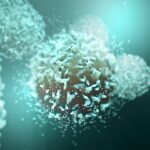Cell and gene therapies represent an expanding category of transformative medicines with the potential to change the way we treat human diseases. Broadly, these novel therapies include both in vivo and ex vivo strategies to modify target cells. Ex vivo therapies that involve isolating cells from a patient (autologous) or a donor (allogeneic) and modifying them in the lab to generate highly precise therapies against a disease target. These modified cells are then infused into the patient where they can exert a therapeutic effect in vivo.
While autologous CAR-T cell therapies remain the poster child for the sector, cell and gene therapies are being developed using many different cell types, such as NK cells and hematopoietic stem cells (HSCs), for immuno-oncology and regenerative medicine. The autologous nature of the approved therapies has also highlighted their limitations, including the challenges associated with leukapheresis collection, manufacturing, and efficacy in a heavily pre-treated patient population. Implementing allogeneic strategies—where cells from healthy donors are used—has the potential to overcome many of these limitations. One strategy is generation of “off-the-shelf” products—such as AllCells’ GMP In Stock Cryopreserved Leukopak—conferring a more uniform starting material to support predictable manufacturing and consistent performance of the cell product, as well as shorter lead times1. Donor-sourced cellular material can also be used to support process development and method validation activities in autologous programs as chemistry, manufacturing, and control (CMC) guidelines for Investigational New Drug Applications (INDs) become more well-defined2.
Challenges to Cell and Gene Therapy Development
The lack of standardization with donor cells for clinical applications is a primary challenge that, coupled with inherent donor variability and an ever-changing regulatory landscape, necessitates deep understanding of donor sourcing, procurement guidelines and testing. Regulators look more favorably on developing therapies where the regulatory compliance of starting materials has been considered part of process development/validation since patient safety is paramount. Needing to re-validate raw materials that do not meet phase appropriate regulations costs time and money. If manufacturing uses a third-party contract manufacturer (CMO), delays caused by revalidation efforts could cause you to miss a scheduling window that can severely impact timelines, which are magnified by the current biomanufacturing capacity shortage faced by cellular/gene therapy developers3.
The advantages of partnering with a trusted supplier are numerous but the three key benefits to initiating clinical supply discussions early include:
- Quality and consistency of raw materials
- Meeting phase-appropriate regulatory requirements
- Supply chain security
Strategic Advantages to Early Planning
Quality and Consistency of Raw Materials
Planning with the end goal in mind early in development is essential to success especially for donor sourcing strategies. Since the quality of a therapeutic is only as good as the quality of the starting cells, initiating clinical good manufacturing practice (GMP) raw material supply discussions early in development can mitigate risks and address increasing regulatory requirements and eventual scale-up demands as products move toward commercialization. Suppliers who have ingrained expertise, established donor networks, and optimized collection protocols can provide value from the onset. For instance, the donor population of some therapeutic programs have very stringent donor criteria (i.e., viral and health status of donors, minimum percentage of cell subpopulations) that may dramatically limit the potential donor pool, and it can take a long time to find and establish a qualified donor supply. Additionally, early knowledge of your program goals can help a supplier design a tailored donor program, readily facilitate new or changing needs, and provide valuable insight to reduce potential pitfalls to your program. An experienced supplier with a diverse and recallable donor network, adherence to Good Tissue Practice (GTP) for procurement of human cells, tissues, and cellular and tissue-based products (HCT/Ps), and the ability to support GMP cell processing is invaluable to ensuring the quality and consistency of clinical raw materials.
Meeting Increasing Regulatory Requirements
Cell therapy developers must navigate increasing regulatory requirements to ensure product and patient safety as their product advances through the pipeline. Because the donor collection is considered part of the manufacturing process for cell and gene therapies, regulators expect that the IND will include the procedures for collecting, testing, shipping, and storing the apheresis starting material4. Donor materials designated as RUO are appropriate for discovery phase, preclinical development, and process development. As a therapeutic moves to IND-enabling studies where donor criteria and processes become more defined, there is a need to transition to GMP materials, which have the traceability, change control, and testing suitable for clinical use. Donors must undergo more stringent screening to qualify for clinical donations (FDA 21 CFR Part 1271, Subpart C), potentially limiting the donor pool size. Therefore, partnering with a supplier with the expertise in delivering GMP donor materials can prevent gaps in the RUO to GMP transition.
While it may not be feasible to start from the beginning with GMP materials, adoption as early as possible in development can prevent the need for raw material revalidation, potentially saving time for IND submission.
Supply Chain Security
Supply chain security is essential to bringing a product to market. Early discussions with suppliers helps mitigate any disruptions in supply and can accommodate scale-up or scale-down needs depending on downstream factors such as the efficiency of gene transfer steps to engineer the cells, or market demand of a product that impacts manufacturing frequency/output. Making critical changes to raw materials in late-stage clinical evaluation can impose significant delays and even require additional arms of a clinical trial to execute comparability studies.
Finally, establishing an effective working relationship with a supplier, where contracts and non-disclosure agreements are commonplace, may take time—yet another reason to start discussions early to overcome unnecessary delays and cost.
AllCells GMP Capabilities
AllCells has the capabilities to help cell and gene therapy developers overcome the raw material challenges to support product development from inception to commercialization. With over two decades of expertise in the industry, AllCells has a reputation for unparalleled quality and consistency. Combined with unique donor management services, integrated project management, and extensive regulatory expertise, AllCells has the tools to help developers through every stage of their program. The opening of new donor collection facilities and expanding GMP processing capabilities is evidence of the commitment to meet growing demand in the sector. AllCells takes a collaborative and customized approach to support the unique needs of each program without compromising on quality to ensure long-term success.
To learn more or request a quote, read about AllCells’ GMP Products.
References
- Caldwell KJ, Gottschalk S, Talleur AC. Allogeneic CAR Cell Therapy-More Than a Pipe Dream. Front Immunol. 2021;11:618427. Published 2021 Jan 8. doi:10.3389/fimmu.2020.618427
- Chemistry, Manufacturing, and Control (CMC) Information for Human Gene Therapy Investigational New Drug Applications (INDs). FDA. https://www.fda.gov/regulatory-information/search-fda-guidance-documents/chemistry-manufacturing-and-control-cmc-information-human-gene-therapy-investigational-new-drug (Accessed May 2022).
- R. Rader. Cellular and Gene Therapies Face a Manufacturing Capacity Crunch. Pharmaceutical Technology 2020: 44 (10), 56-59.
- Seymour B. Considerations for use of hematopoietic stem cells in allogeneic therapies. Cell & Gene Therapy Insights 2022; 8(2), 261–267. doi:10.18609/cgti.2022.040




